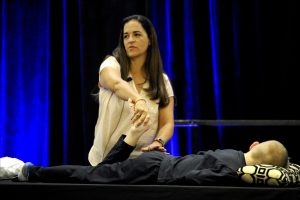Physical Therapy Essential for Duchenne Boys if Given with Care, Expert Says
Written by |

UF's Claudia Senesac spoke at the 2019 PPMD conference about physical therapy for Duchenne boys. (Photo by Larry Luxner)
Years ago, doctors believed that no exercise was best for boys with Duchenne muscular dystrophy (DMD). Today, DMD experts all agree: exercise extends lives.
But what kind of exercise is ideal for Duchenne kids? How much is too much? And what about stretching, night splints and specialized equipment?
Physical therapist Claudia Senesac, who’s been working with Duchenne boys for nearly 40 years, is among those who can help to answer these kinds of questions.
Senesac is a clinical associate professor of physical therapy at the University of Florida’s College of Public Health. In late June, she lectured on the subject “Why Physical Therapy is So Important in Duchenne” at the 2019 annual Parent Project Muscular Dystrophy conference in Orlando.
At one extreme, she said, are athletic parents who push their sons too exhaustion when it comes to exercise. At on the other are those who want to carry their boys everywhere.
“If a boy complains of sore muscles, that’s too much. If a boy ends up sitting the rest of the day after an activity, that’s too much,” she said. “You don’t want them to do so much that they’re actually damaging their muscles during the activity. We don’t know that sweet spot between what’s too much and what’s enough, so we like to err on the cautionary side.”
Interested in Muscular Dystrophy News research? Sign up for our forums and join the conversation!
“Ultimately, it’s the parents’ decision,” she added. “I’m walking a fine line, providing care, telling them what the options are and trying to be reasonable.”
Stretching and night splints
It’s hard to know how much exercise is enough, and when to stop. Many studies focus on this topic, some at the university where Senesac works. But common sense should be a guide.
“Do not overdo it,” she advised. “Build it into the routine you do on a daily basis that taking a break is OK. Maybe don’t call it a ‘break time.’ Say it’s ‘snack time,’ so it’s something they won’t feel self-conscious about. Overdoing can result in breakdown of the muscle, and one of the signs of that is having dark urine, or blood in the urine.”
Still, she said, if Duchenne boys don’t exercise at all, their muscles will atrophy.
When Senesac sees a new patient, the first thing she does is an assessment of his functional levels and range of motion. Then she comes up with a plan of care that includes exercise, some stretching and perhaps a discussion about night splints.
“Assessments give us information about your child and help us develop a plan of care that identifies critical periods of time, and alerts us to change,” she said. “There isn’t research that shows that stretching will prevent fractures in Duchenne. However, there hasn’t been any published research done on long-term stretching. I don’t want parents to feel guilty because they can’t stretch. It will not prevent progression of the disease. Having said that, some boys progress faster than others.”
Senesac currently has 12 boys with Duchenne under her care. Some come once a week, but most see her more like once a month or even once every six months.
“Stretching is a big part of what we do for boys with Duchenne,” she said. “Research says stretching can improve range of motion.
“Frequently, the first muscle group that gets tight are heel cords and hamstrings. We’d like for you to know the right way to stretch those muscles. It’s important for your boys to stay flexible and mobile. In addition, stretching can improve circulation to the muscles and keep joints lubricated.”
Find a PT who knows Duchenne
Senesac realizes that families are really busy, especially parents with full-time jobs caring for other kids.
“It can be a real challenge to fit stretching in,” she said. “If you can’t, there are other alternatives” that a therapist or doctor could suggest.
One possible alternative is swimming, which Senesac calls “a great activity for boys with Duchenne, because it eliminates gravity and it’s usually a family activity, and not something you do by yourself.”
Also helpful are night splints, which are braces worn overnight. These give Duchenne boys a prolonged stretch and are especially ideal for stretching heel cords.
What if a child refuses to wear them?
“We have all kinds of little tricks and incentives,” she said. “Starting this early is a good idea, because then the boys get used to it, and it’s not something out of the ordinary.”
Senesac’s final piece of advice: Find a therapist who specifically works with DMD. This is especially important in case your insurer balks at paying for equipment needed for your son’s care.
“If your therapist doesn’t have experience with Duchenne, then you need to reach out to an expert who does,” she said, adding that insurance issues can be deeply frustrating. “Therapists can help justify a piece of equipment, which is needed for you to bill your insurance company. Therapists are trained to do that.”







